Practitioner resources | Welcome to the Training Zone | Ten Footsteps 2023, course 1
Ten Footsteps 2023, course 1
Before the course
- Welcome to the course
- Pre-course preparation
- Pre-course evaluation
During the course
- Session dates and links
- Recordings and resources
- Session slides
- Written reflection
Post-course information
- Accreditation
- Post-course evaluation
My courses
Welcome to the course
Welcome to the Ten Footsteps training programme from Live Well with Pain.
This training will focus on helping you to gain more knowledge and skills to support people with persistent pain. It covers ways to support self management of this long-term health condition with more confidence, using a wider range of resources, tools and skills.
We hope you’ll find the sessions interesting and fun. The course is a co-production of practitioners together with people who live with persistent pain, co-delivering.
Your course facilitators are:
Louise Trewern and colleagues who bring insights based on their lived experience of persistent pain
Frances Cole, former GP and Pain Rehabilitation Specialist
Laura Hissey, Health Psychologist specialising in Pain Management
Kirsty Jackson, Specialist Physiotherapist in Pain Management
Pre-course preparation
1. Familiarise yourself with Live Well with Pain
As part of your pre-course preparation please ensure you have explored our website.
The practitioners’ guide to the Ten Footsteps is a good place to start, as it takes you through the ten footsteps around which your training will be structured.
Next, explore the approach used by Live Well with Pain, which is based on the Five Areas CBT person centred model.
This website also has a wide range of self-management resources. Have a look at the downloads that you can share with the people you are supporting, and visit the skills and knowledge section to see the kinds of techniques that you’ll be able to explore in more depth during the training course.
2. Watch this one video
This is one video that may change your thinking on pain.
Watch from 33 minutes to around 45 minutes. Of course, you can watch some more and learn even more! It is fun too!
Did it change your thinking on pain? And if so, why did it change it?
3. Reflective Practice
The training is designed to help you use new knowledge and skills to guide every day self-management practice.
It is therefore helpful if, before the course, you are able to reflect on some of your own experiences of working with people with persistent pain so that you can share some of these examples during the training sessions.
It may help to think about these four aspects of your clinical / work experiences:
-
What approaches or strategies have you found work well?
-
What aspects of supporting people with pain management have you found challenging?
-
What are common barriers stopping people with chronic pain engaging in self-management?
-
What kinds of support are you finding that people with chronic pain need?
4. Explore the Footsteps Festival
Footsteps Festival is an ongoing web-based festival that is building into a really useful resource of recorded social prescribing events and activities.
Footsteps Festival was developed by Live Well with Pain during the COVID lockdowns, as a way of bringing togther people with lived experience of pain, clinicians, health coaches, researchers and many others. It offers a different, creative take on managing pain.
Explore the Festival
5. Further (non-essential) reading
Live Well with Pain has compiled a list of trusted publications that have proved useful in helping people to understand and self manage their pain.
Explore the publications
Pre-course evaluation
Before beginning the training, we ask all participants to complete a brief online self-assessment of your knowledge and skills.
This will help you be clear about your learning needs and plans for the Ten Footsteps training. It will also help us ensure the training is focused on participants’ needs.
You may also find it useful to make a note of your two stronger skills and two of your weaker skills areas to guide your goals for learning!
Pre-course evaluation
Session dates and links
Session 1: Tuesday 17 January, 9.20am
Meeting ID: 867 6073 8892
Passcode: 660555
Join Zoom Meeting
Session 2: Friday 17 February, 9.20am
Meeting ID: 841 7940 1904
Passcode: 676362
Join Zoom Meeting
Session 3: Tuesday 14 March, 9.20am
Meeting ID: 861 4165 8930
Passcode: 335901
Join Zoom Meeting
Recordings and resources
Session 1
Session 2
Session 3
Session 1
Here are the resources featured in session 1:
The Pain and Self Care Cycles
Exploring the Pain Cycle with the person you are supporting can help them recognise how pain can affect different aspects of their life in negative and self-reinforcing ways.
Also included is its companion diagram, the Self Care Cycle, which shows the positive outcomes of adopting a range of self-management approaches to undo or limit the impact of pain.
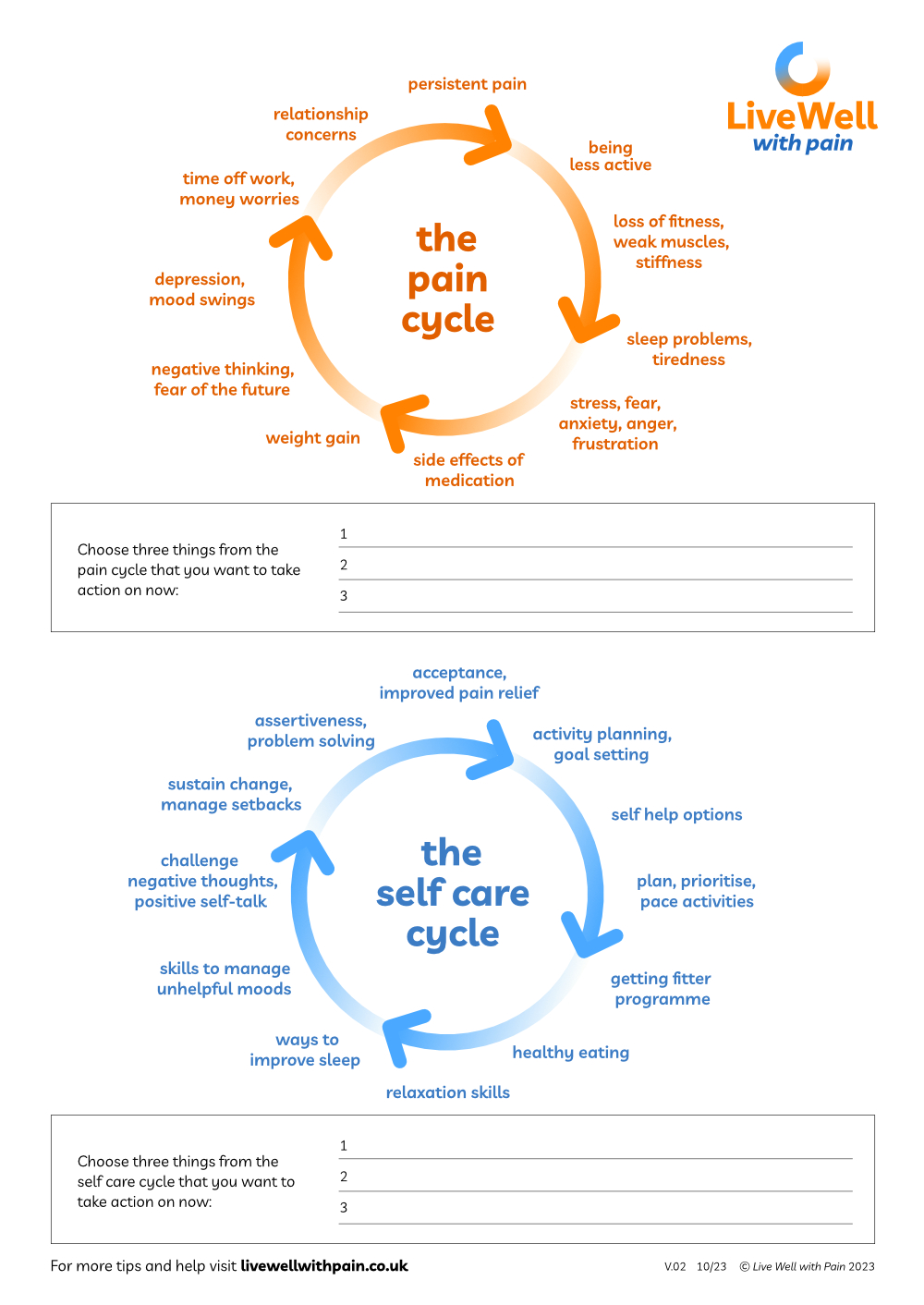
Live Well with Pain Health and Wellbeing Check tool
The Live Well with Pain Health and Well Being Check tool is a self-completion, person-centred tool that can be shared easily with patients and clients.
The data from this completed tool will help identify the actual current impact of chronic pain on the individual and their health.
You can find a more detailed explanation of the Live Well with Pain Health and Well Being Check tool here.
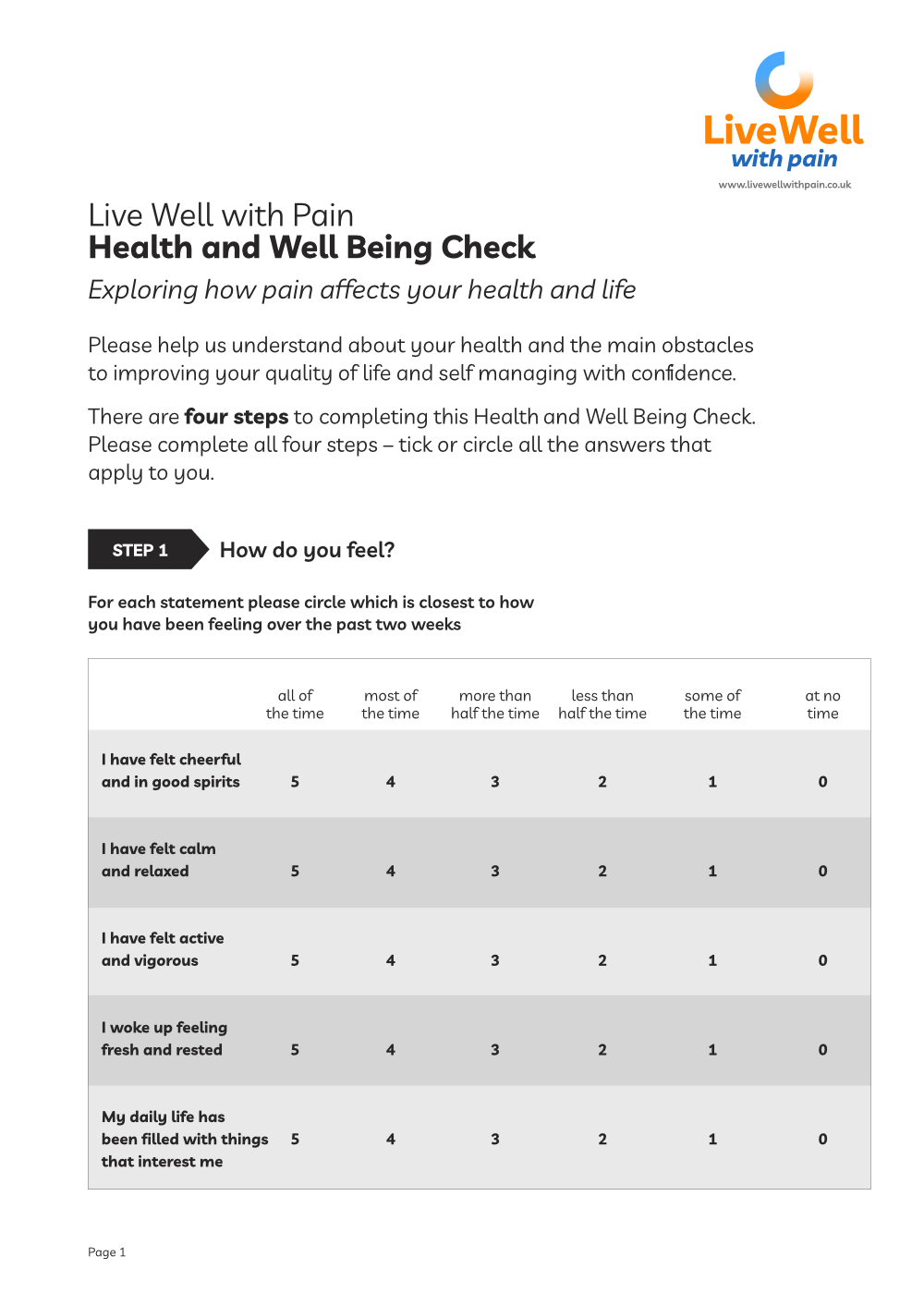
Pain is like an iceberg
Persistent pain is like an iceberg – there’s so much more to it beneath the surface. Use this sheet with your patient to explore how pain impacts many different areas of their life – areas that could be addressed using self management strategies.
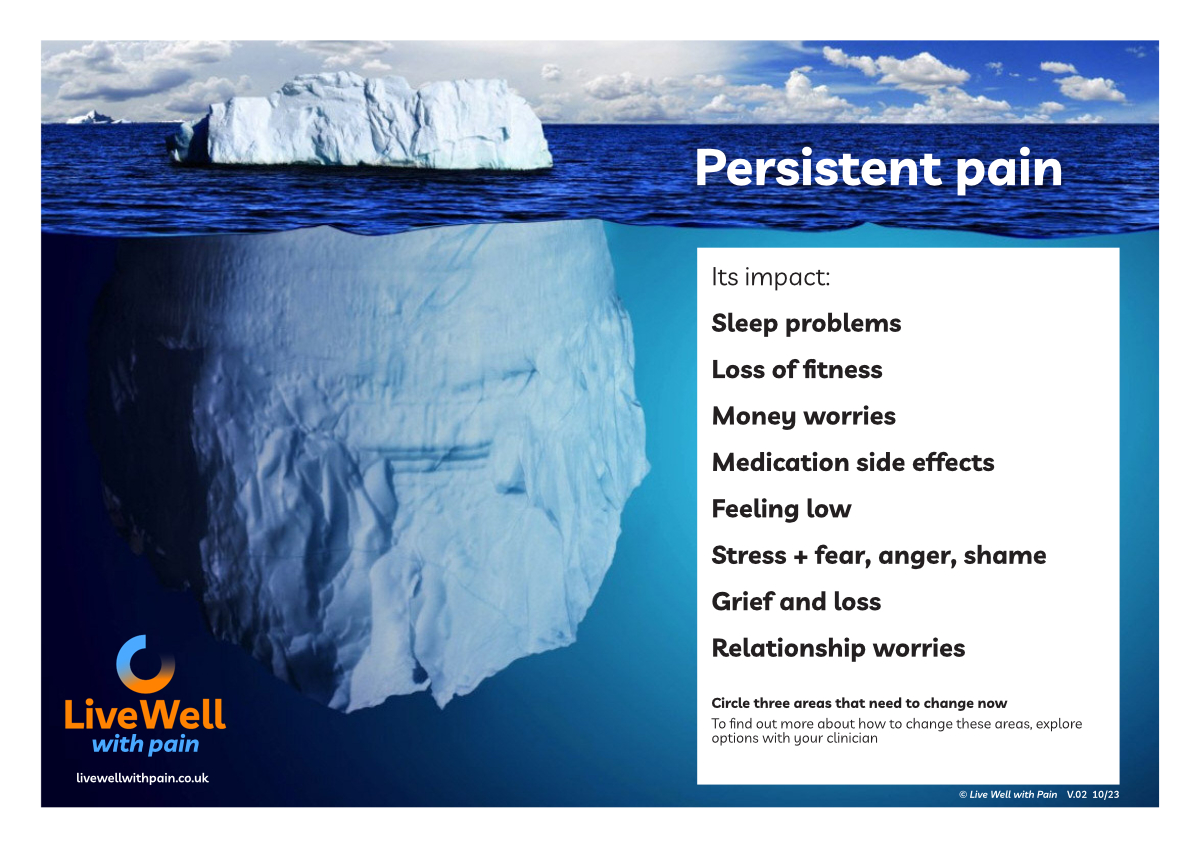
A bus journey
The Bus Journey tool is a metaphor tool that can help people understand pain is part of them and their life at present. This is about learning ways to self manage pain by:
- Letting the person decide where they want to put the pain on their bus now, rather than in the driving seat or at the steering wheel.
- Supporting the person to decide what is the new direction of the bus journey, its route, new stops and which passengers they want on the bus from their family, friends and clinical team, social prescribers etc.
- Helping them set rewarding, paced goals and focus on their priorities for change.
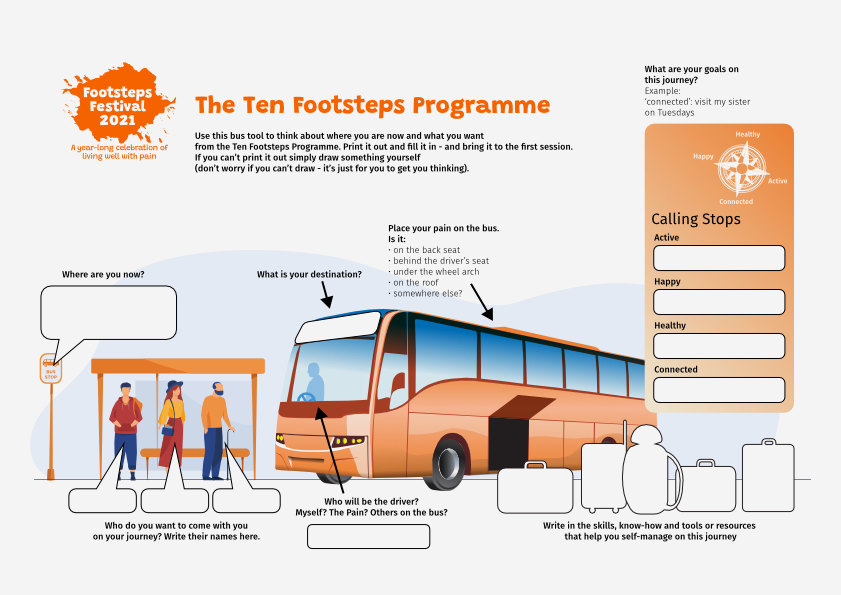
Session 2
Here are the resources featured in session 2:
My Activity Diary
This diary or log completed by the person over at least 2-3 days helps them and others understand their current pacing style.
Completing the diary enables a person to track their activities including sleep, rest, sitting or lying down periods, as well as all the activities they carry out through the 24 hours.
It helps to record the minutes spent on each activity to get a fuller picture.
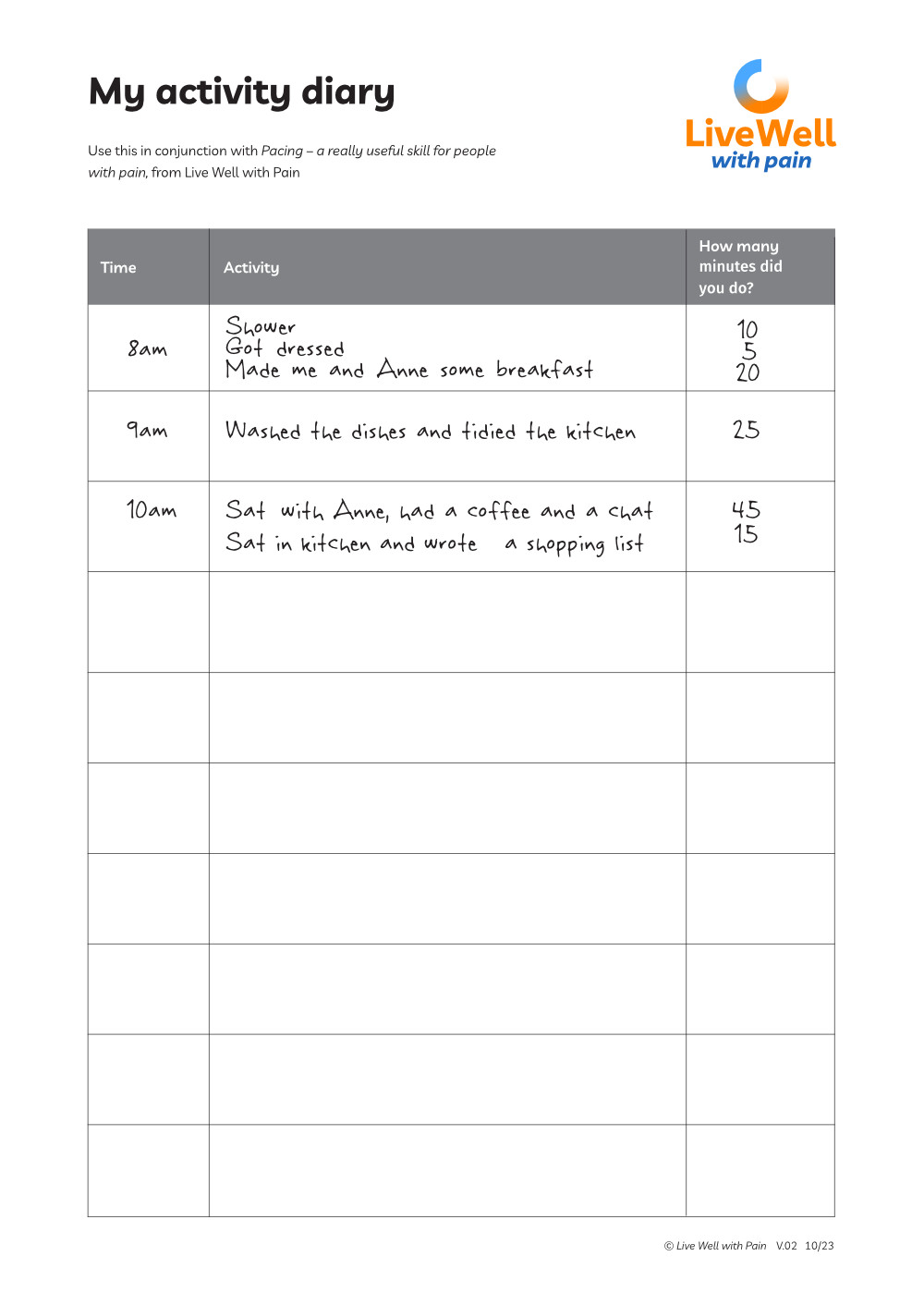
Pacing
ALSO AVAILABLE AS A PRINTED BOOKLET
Pacing is a key everyday skill to learn and use for people living with persistent pain. This leaflet offers useful techniques for learning how to balance activities through the day and avoid the common 'boom and bust' cycle experienced by many with persistent pain.
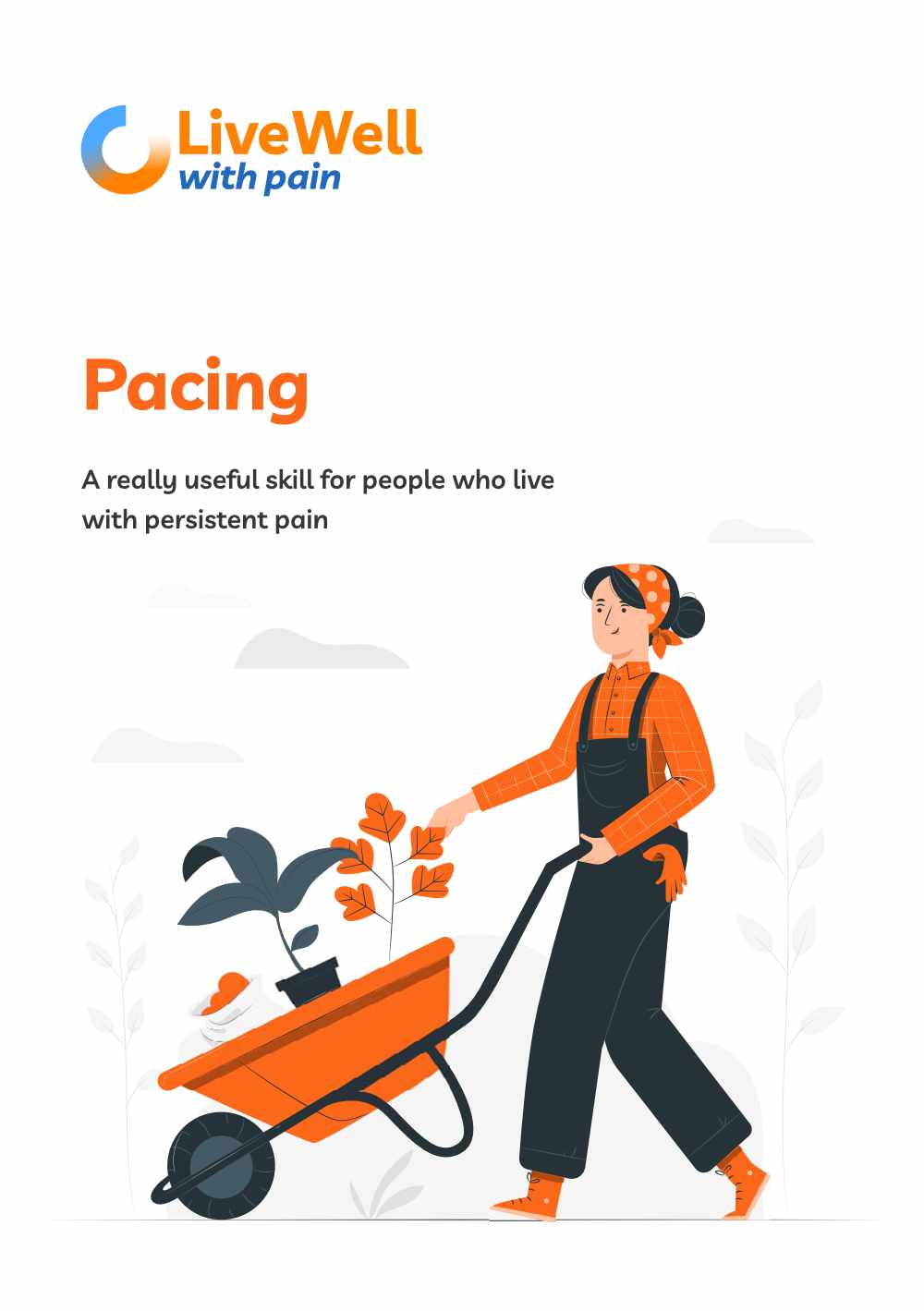
My Daily Pacing Plan
The person you are supporting can create a Daily Pacing Plan to help them balance and pace activities.
The ABC questions can help them build their Daily Pacing Plan:
A: What Activities can I pace today?
B: How long before I take a Break?
C: Check what is the effort level on an Effort Scale
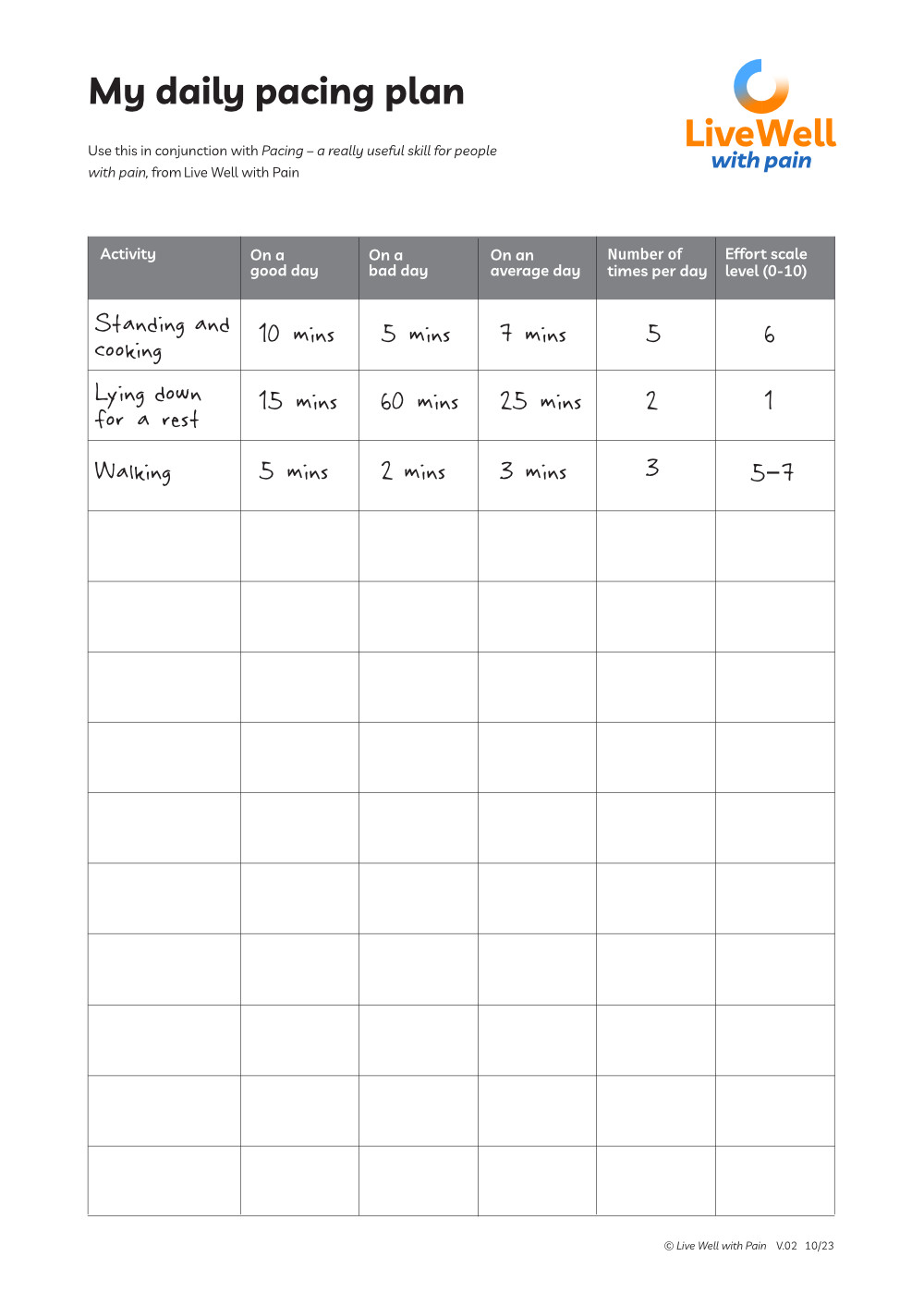
Goal setting
ALSO AVAILABLE AS A PRINTED BOOKLET
Achieving goals, especially for people living with persistent pain, can be difficult and challenging. One way of increasing the ability to reach goals is to develop the skill of goal setting. This leaflet for patients explains how.
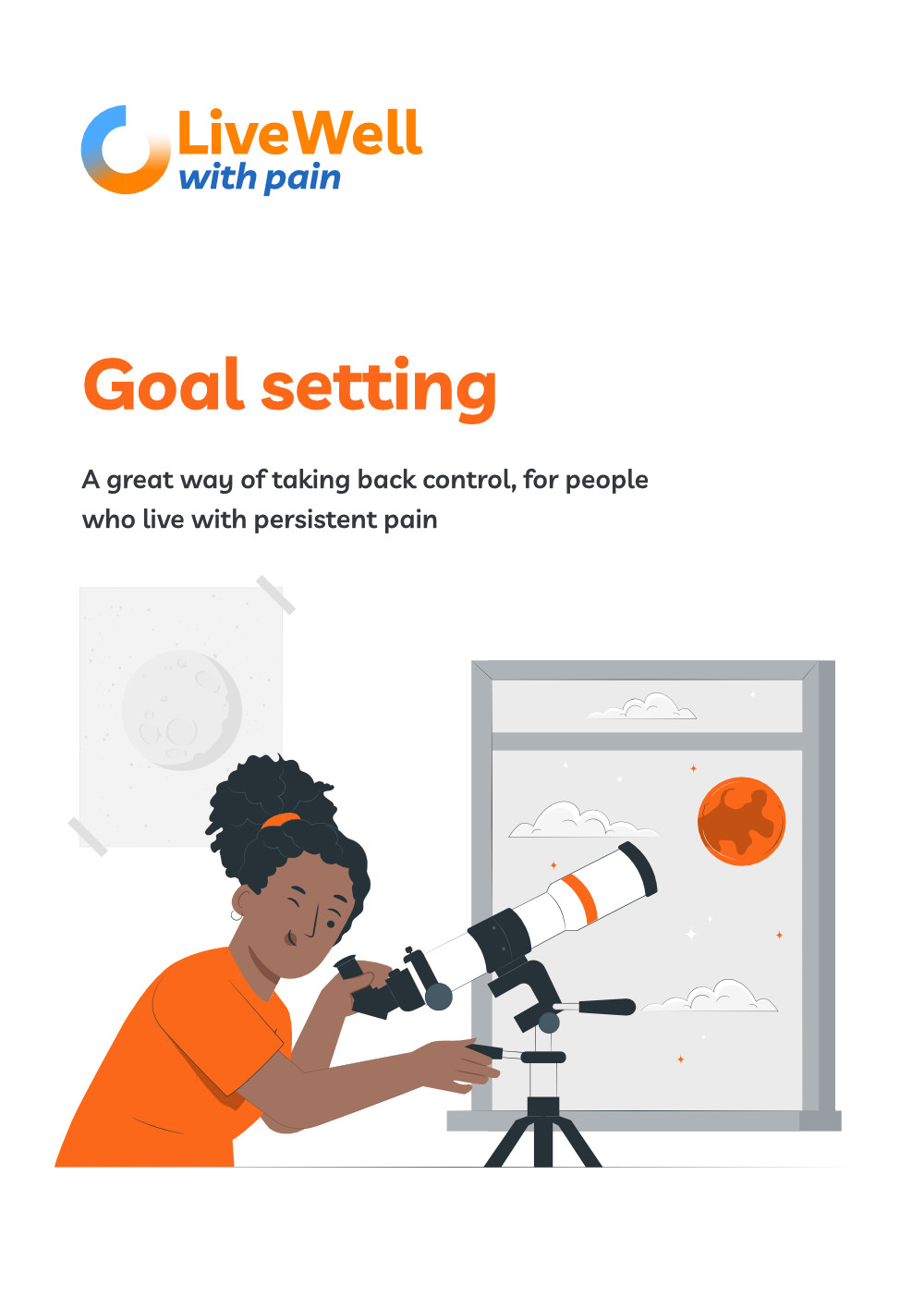
My SMART Goals
This A4 sheet encourages people to start thinking about goals in different areas of their life.
It should be used in conjunction with the Goal setting booklet.
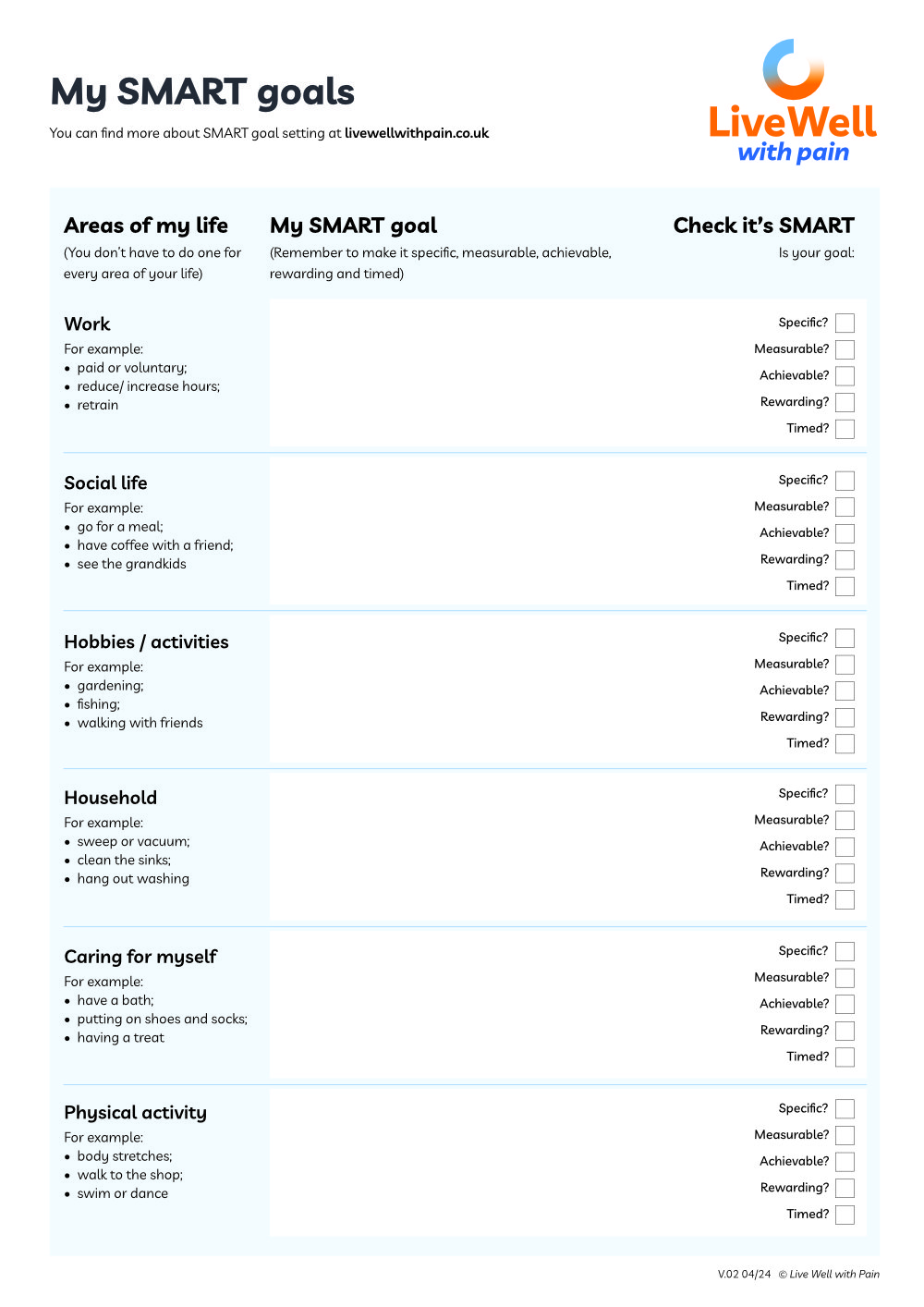
My Goal Ladder
Many people find it useful to think about their SMART goals like steps on a ladder. This A4 sheet will help a person to break down each goal into small, achievable steps. These can be used to build up, week by week, towards a bigger goal.
It should be used in conjunction with the Goal setting booklet.
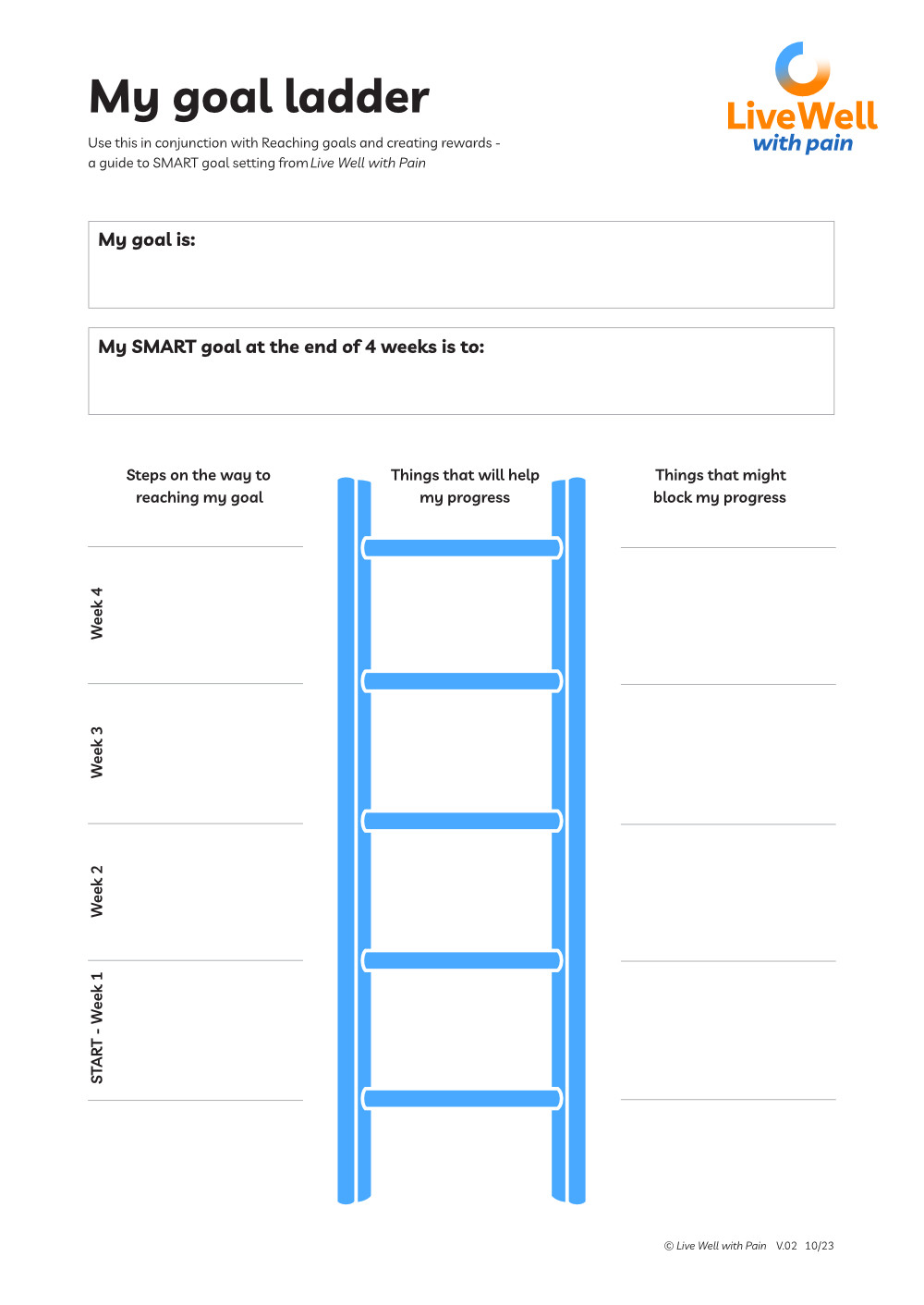
How to Sleep Well with Pain
ALSO AVAILABLE AS A PRINTED BOOKLET
This leaflet draws on recent sleep research and provides simple-to-follow guidance for patients to develop the skills they need to start getting a good night’s sleep.
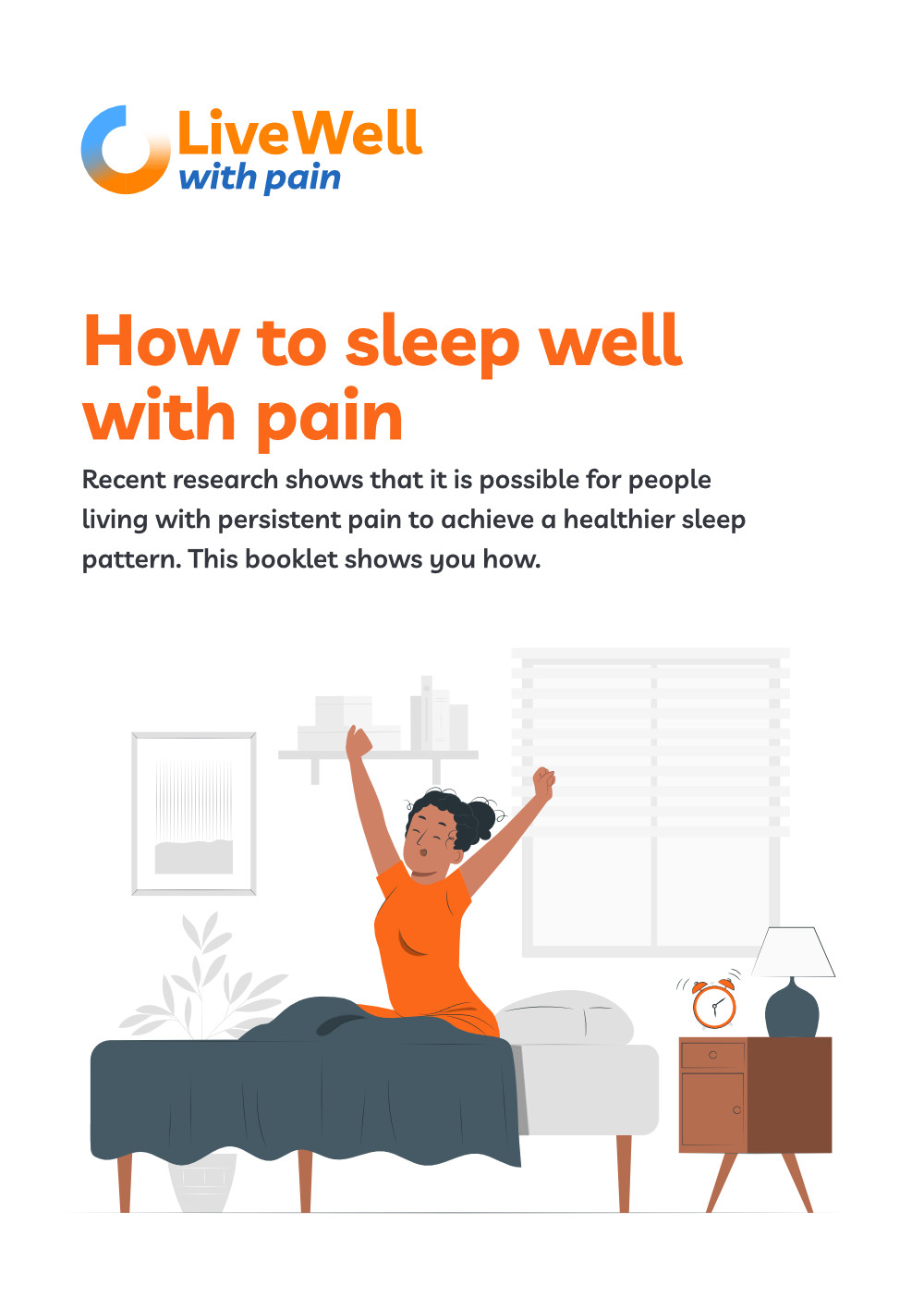
Session 3
Here are the resources featured in session 3:
Medicines Decision Guide
Are you wondering whether the pain medicines you take are really helping?
Complete this guide and and share it with your GP, pharmacist or pain management team. It will help them understand why you may be thinking about continuing, reducing or stopping your pain medicines.
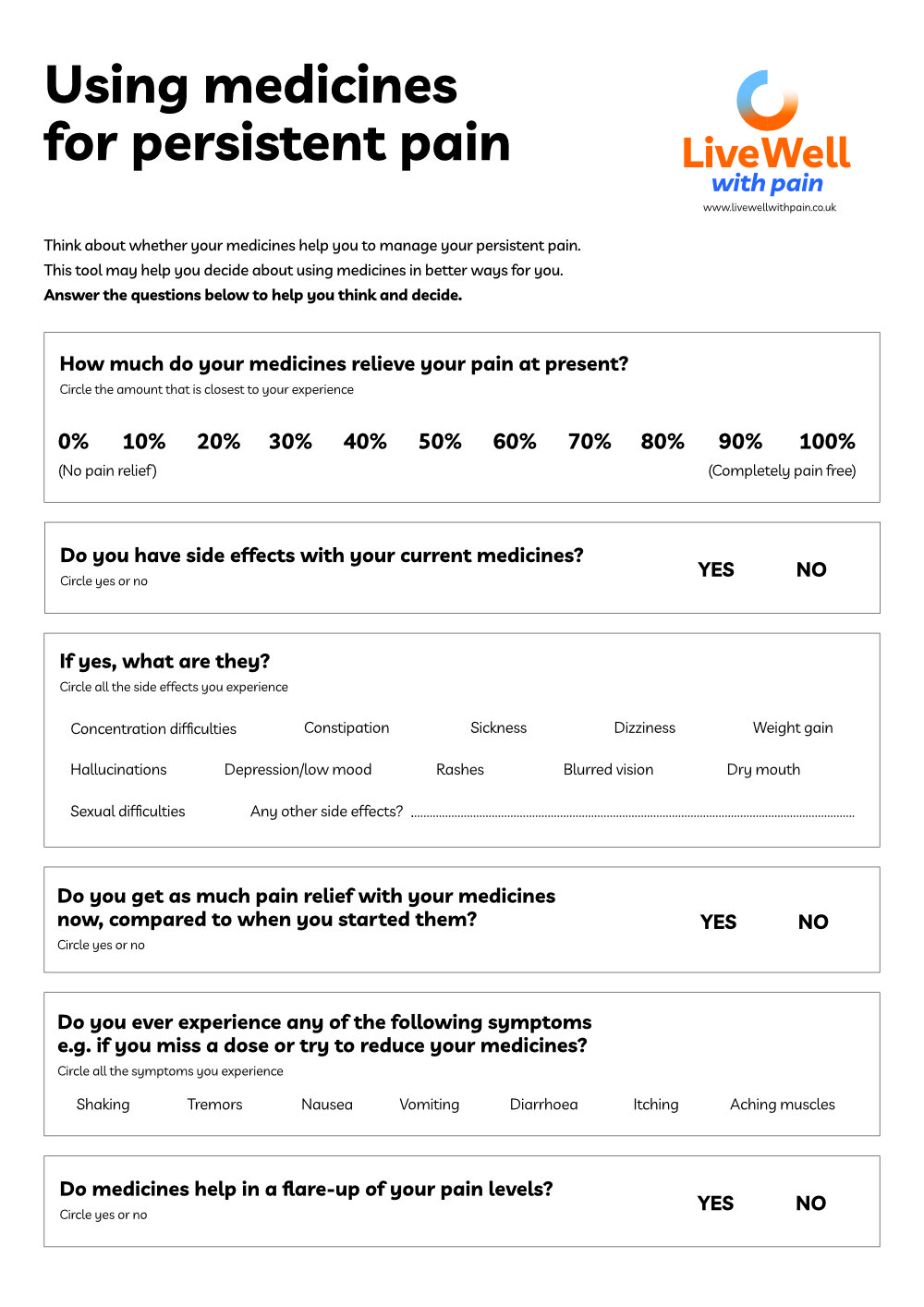
Painkillers – the downside
Fun poster with a serious message – put it up in your waiting room to raise awareness of the dangers of long term opioids use to control pain. Includes a 'call to action' to talk to the healthcare team about better ways to manage pain.
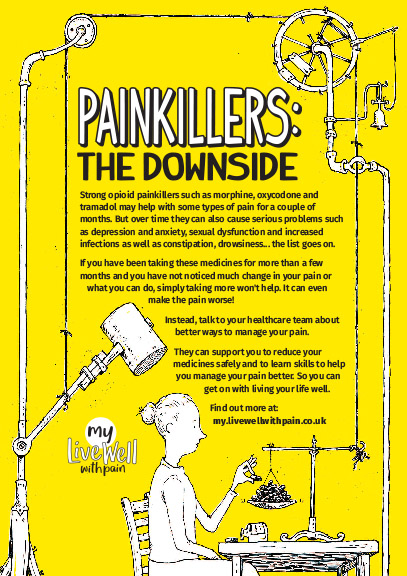
The Great Opioid Side Effect Lottery
Often, patients being prescribed opioids for their persistent pain do not know how little benefit they offer over the long term, or how prevalent and varied are the side effects people experience.
This A4 sheet, designed to be used by clinicians in their consultations with patients, is a simple way to raise the question of benefits versus side effects.
Using a ‘lottery scratch card’ metaphor, the sheet explains that opioids only actually reduce pain for around 10% of people in the long term, and their side effects can be both wide ranging and serious.
It lists many of the side effects, and provides a number of statistics to show how common these side effects are.
Working through the list with your patient, ask them to tick those side effects they are experiencing, as a starting point for introducing the idea of a medicines review.
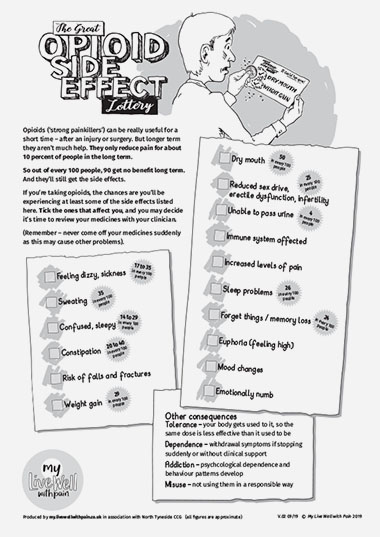
Managing setbacks
Practical advice and tips for people with persistent pain to help them build a setback plan. Can be used during a setback or, even better, during better times so the person is prepared for when a setback happens.
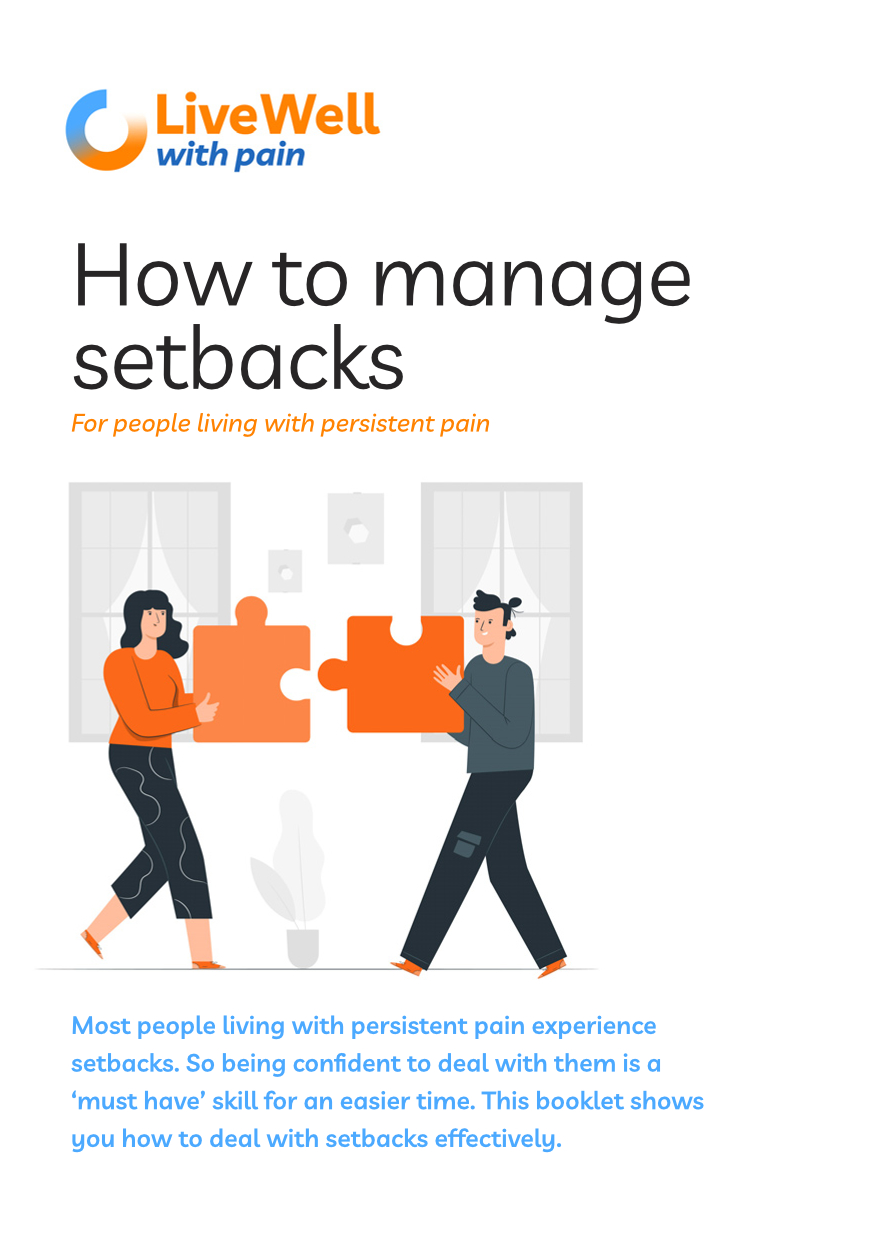
Written reflection
As part of your learning we encourage reflection on your practise. To help with this we have created a form which you can complete online, here:
Complete your reflection
Please complete the form with:
-
a reflection about an encounter when it was difficult to support somebody with self management
-
a reflection about an encounter when you used your skills in supporting self-management successfully
If you would like to keep a copy of your responses please save the PDF that you see when you submit.
Accreditation
Once you have completed your course, you will be able to obtain a Certificate of Attendance from the Personalised Care Institute (PCI). This is worth 12 CPD points.
After the third and final session, we will email you a link to create an account with the PCI, so that you can obtain your certificate.
Post-course evaluation
As part of our continued accreditation with the Personalised Care Institute, all course participants are asked to complete a post-course evaluation.
You can complete this online, here:
Post-course evaluation